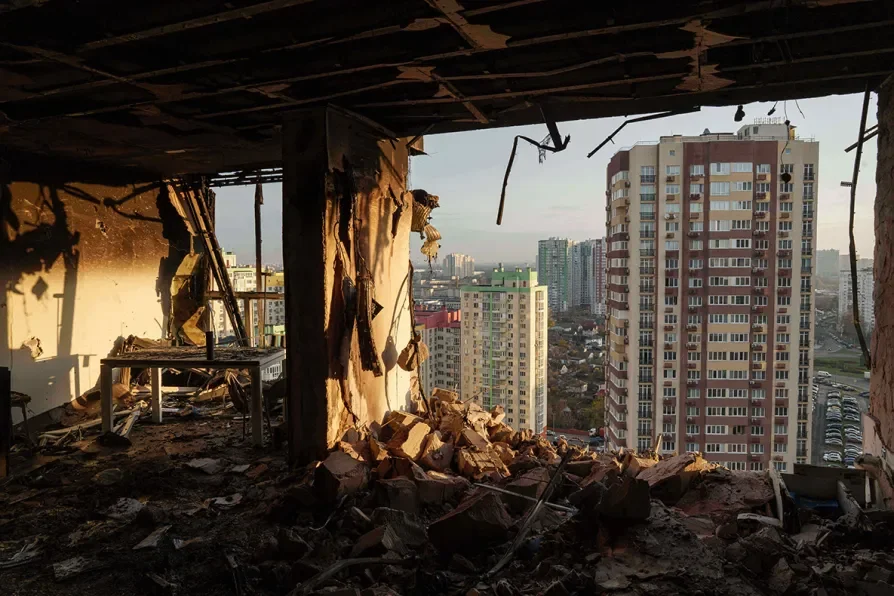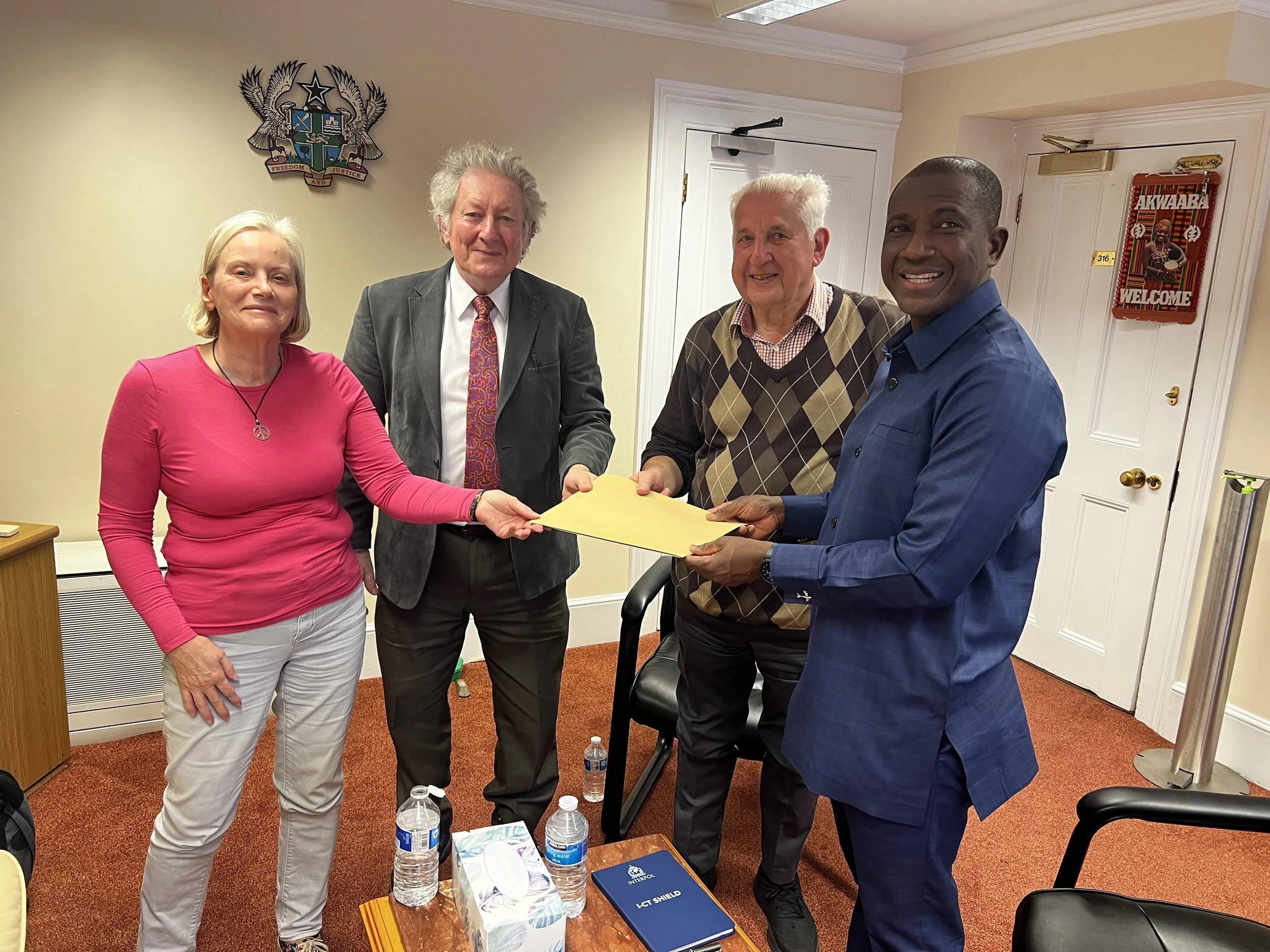On the 19th of September, London CND marked the lead-up to the UN International Day of Peace by visiting embassies across the capital, reinforcing its commitment to nuclear disarmament. This report delves into the day's activities.
Push for de-escalation as danger of nuclear conflict escalates
As the war in Ukraine continues and escalations risk a much wider war, London Region CND Chair Carol Turner wrote the below article for Labour Outlook on the need for de-escalation.
The call by President Zelensky to be allowed to use long-range cruise missiles supplied by its NATO allies deep within Russian territory posed an imminent threat of a Europe-wide war between nuclear armed states. The announcement by Prime Minister Starmer, that talks with President Biden resulted in no decision permitting Ukraine to do so is a welcome though temporary respite in this rapidly escalating conflict.
In a statement at the end of the talks, Starmer reiterated his ‘ongoing’ and ‘unequivocal’ support for Ukraine, and emphasised the discussion had been ‘productive’ and concentrated on ‘strategy’, rather than a ‘particular step or tactic’. The White House issued a similar statement. Behind the scenes, the talks also signal the UK government is positioning itself to become the NATO lead amongst European allies. This will put Britain on the front line.
This current phase of the Ukraine conflict started on 7 August when Ukraine launched a ground incursion into Russian territory for the first time, after the US and other NATO allies gave the go-ahead for weapons they’ve supplied to be used against military targets within Russia. This permission is needed because many of these weapons require access to guidance systems controlled by the US.
Russia responded to the August incursion with heavy bombardment of Ukraine’s second city, Kharkiv, and stepped-up its military action in the Donbas region. This prompted Zelensky to seek US and UK agreement for long-range cruise missiles, including the Anglo-French Storm Shadow system.
The summer escalation in the Ukraine war took place against the backdrop of a NATO Summit in July that signalled further steps towards ‘globalising’ the role of the North Atlantic Alliance –beyond its Euro-Atlantic axis, to further extend its growing presence in the Indo-Pacific. Note for example, increasing references to a Russia-China-Iran-North Korea axis, when discussing the Ukraine war. More tangible manifestations at the July Summit of globalisation the Alliance included:
announcing plans for long-range US cruise missiles to be deployed periodically in Germany from 2026, and
identifying China as the ‘decisive enabler’ of Russia’s military action in Ukraine.
Britain’s role
There can be little doubt that more calls to intensify the conflict will follow in the weeks and months ahead. The anti-war and labour movements must remain alert to the dangers of Ukraine becoming a Europe-wide war. Not only NATO but also Russia is preparing for this. In May, for example, Russia concluded an agreement to deploy tactical nuclear weapons in Belarus, the first deployment of Russian nuclear weapons outside its territory since the collapse of the Soviet Union in 1991.
Intensification of the war creates a particular danger for Britain. The UK recently agreed to become one of NATO’s European nuclear bases. Earlier this year, US nukes were cleared for delivery to locations in Europe. Lakenheath airbase in Suffolk already has the facilities needed to house them. The F-35 fighter bombers which will deliver them to their targets are already stationed at Lakenheath and pilots trained to fly them.
This not only puts Britain on the front line of a European war, it also makes us a direct target for retaliation. The situation remains extremely dangerous and should be treated as such.
Missile diplomacy
At present NATO and Russia are engaged in what might be termed missile diplomacy. In response to Zelensky’s threat of a long-range cruise missiles attack and the discussion taking place between the US and UK, President Putin said (quoting the English translation used by the BBC):
‘If this decision is made it will mean nothing other than direct participation by NATO countries, the United States and European countries, in the war in Ukraine. And this of course changes the very essence of the conflict. This will mean that NATO countries – the United States, European countries – are fighting with Russia.’
The Russian Ambassador to the UN has reiterated this.
Putin’s response has been widely interpreted in the West as a declaration of war by Russia. However, the English translation of Putin’s statement suggests his language is crafted to avoid making such a clear and definitive declaration.
The US and its NATO allies have both conventional and nuclear superiority over Russia, although the number of US and Russian nuclear warheads are approximately balanced. It must also be borne in mind that a direct military confrontation between Russia and NATO would be likely to prompt other states to engage on the side of Russa.
Divisions over strategy
The Biden administration was seen as divided over Ukraine’s proposal to escalate – unsurprisingly, perhaps, in the run up to a presidential election. It is already being pointed out that this doesn’t mean Ukraine won’t get the green light for Storm Shadow missiles in future, It does suggest though that the US would seek to take a back seat and, if the OK were to be given, Britain would likely take the lead.
The relentless war propaganda in the UK media and across Europe serves to cover growing unease amongst the movers and shakers – different assessments between NATO countries, as well as between military and political leaders.
German Chancellor Olaf Scholz made a call to rekindle diplomatic efforts to end the war in Ukraine, for example, though Deutsche Welle Germany’s leading international broadcaster points out reception has been ‘muted’. Speaking on the BBC’s Sunday with Kuenssberg programme General Sir John McColl, former NATO Deputy Supreme Allied Commander Europe, said ‘the question of winning or losing is not something we will be able to achieve’. Ukraine will result in ‘some kind of stalemated negotiations’.
The UK is particularly exposed and vulnerable to the dangers that a war in Europe between nuclear armed combatants presents. The crisis which loomed at the end of last week should leave us in no doubt of the immediate and urgent task for the anti-war movement which is to:
alert the public to the real and present danger that intensifying the war in Ukraine brings
put pressure on the UK government to encourage de-escalation, and
step up the call for a ceasefire and negotiations before it’s too late.
Mutual Defence Agreement becomes a permanent nuclear pact
The new government has put forward an amendment to the Mutual Defence Agreement (MDA) which removes the need to renew it. Since the bilateral nuclear pact was first signed with the USA in 1958, the MDA has been brought before parliament for approval every 10 years. When the amended MDA – the Agreement for Cooperation on the Uses of Atomic Energy for Mutual Defence Purposes to give it its full title – is signed this year Britain’s nuclear sharing arrangement with the US becomes permanent.
Amending the MDA was one of the Prime Minister’s first foreign policy initiatives. Defence Secretary John Healey presented amendments to parliament on 26 July, three weeks after Labour took office. No change in the law is needed for the MDA to become a permanent agreement. As CND General Secretary Kate Hudon observes ‘this spells farewell to even the smallest notion of parliamentary responsibility’ for Britain’s foreign and security policies.
In an explanatory memorandum Healey explained the MDA ‘provides the necessary requirements for the control and transmission of submarine nuclear propulsion technology, atomic information and material between the UK and US, and the transfer of non-nuclear components to the UK’. A Freedom of Information request from the Nuclear Information Service reveals that 955 components were imported from the US between 2020-2023.
The MDA is the basis on which the US provides Britain with nuclear weapons materials and know-how without which Trident could not function. As Richard Norton Taylor rightly points out: ‘It gives the lie to persistent claims by the Ministry of Defence that Britain’s submarine-launched nuclear arsenal is “operationally independent”.’
In exchange for nuclear capability, Britain provides the US with intelligence facilities. Menwith Hill makes signals intelligence available to the US from across the norther hemisphere, intercepting both military and commercial electronic communications. Fylingdales radar station is one of three that comprise the USA’s Ballistic Missile Early Warning System. Information from them initiates a nuclear response from the US or Britain to a perceived threat.
Healey’s memorandum also claims the MDA ‘is consistent with the UK's obligations under the Nuclear Non-Proliferation Treaty and commitments under the Comprehensive Nuclear-Test-Ban-Treaty’. It does not provide for ‘the transfer of nuclear weapons or other nuclear explosive devices, or control over such weapons or explosive devices’.
On the contrary, as the world moves closer than ever before to nuclear war, extending the Mutual Defence Agreement indefinitely is not only a further step in perpetuating Britain’s nuclear arsenal but also in promoting proliferation. The US exercises de facto control over Trident by virtue of the materials and know-how provided. Inevitably, this means too that the US exercises leverage over Britain’s foreign and security policy which is likely to be enhanced by the MDA amendment.






